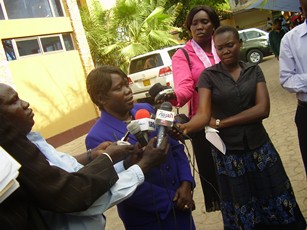S. Sudan’s President invites northern counterpart to Juba
By Ngor Arol Garang
March 21, 2012 (JUBA) – South Sudan on Wednesday announced it will officially invite the president of Sudan, Omer Hassan al-Bashir, to it’s capital, Juba, despite the protests from civil society organisations.

Talks between the neighbouring countries held in Addis Ababa have thus far achieved limited success.
The contentious issues of border demarcation and an oil row, which has seen Juba closing its pipelines, are yet to be resolved.
Anne Ito, the deputy secretary general of South Sudan’s ruling Sudan People’s Liberation Movement (SPLM), upon announcing the invitation, said “we are inviting him [Bashir] because we need peace for Sudanese people.”
Ito said that holding the talks anywhere other than Juba would not “change character of the Sudanese president,” adding that Bashir “remains the same person” since the signing of the Comprehensive Peace Agreement in 2005; the document which ended more than two decades of Sudanese civil war in 2005.
Civil society organisations have decried Bashir’s planned visit due to the arrest warrant against him, issued by the International Criminal Court for genocide, war crimes and crimes against humanity allegedly committed in Darfur.
Last week, Amum said South Sudan will not arrest Bashir “because we have problems to settle first” and that South Sudan does not hold an ICC membership.
The oil row escalated in January when South Sudan halted its oil production. Landlocked South Sudan’s main oil export route is through north Sudan’s pipeline to the coast at Port Sudan. For use of the pipeline Khartoum demanded US$36 per barrel. Calling for less than US$1 per barrel, Juba contested the fee and refused to pay. In lieu of payment, Juba claims Khartoum confiscated oil with a market value of US$35 million, which has resulted in a stalemate.
The disparity of Khartoum and Juba’s transit fee demands makes an agreement difficult to envisage, but their economically precarious positions invite an expeditious resolution. Both Juba and Khartoum have announced austerity measures to take up the slack.
Bashir announced an economic three year “emergency programme” in July.
In February South Sudan announced an austerity package including a 50 percent reduction of non-salary spending and the elimination of unconditional grants to state governments.
South Sudan, which is yet to publish this year’s budget, was reliant upon oil revenues for 98 percent of its revenues. It is investigating alternative pipelines which could loosen Khartoum’s economic stranglehold upon it. However, the economic viability of the pipelines is still a matter of discussion.
The date of Bashir’s visit to Juba has not been announced but sources in the SPLM told Sudan Tribune that it is expected to take place on April 3rd.
(ST)
